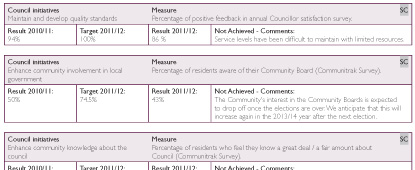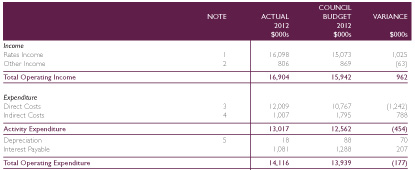At a Glance
Primary Services
- Governance
Why We Do It
- The Elected Members of the district are the community's representatives, making decisions on behalf of and in the interests of, the community;
- Democratic services oversee the election and induction processes and provide support to Elected Members throughout the triennium. Local government impacts everyone so it is important for Council to communicate with people about what it does, what is planned, and how it may impact the district; and
- Local Government administers over 150 legislative Acts, regulations and rules. Legal services ensure Council administers these correctly.
What Has Changed Since The LTCCP 2009/19?
There have been no significant changes to the governance activity since the 2009/19 LTCCP was published.Priorities For 2011/12 |
What We Have / Haven't Achieved |
|---|---|
| Continuing to support the Council, its committees and Community Board meetings | We have provided the support required by the Elected Members and their meetings. |
| Pursuing a continued reduction in Council's legal costs | Legal fees expenditure exceeded, partly due to the greater use of external lawyers whilst the position of In House Counsel was vacant. The additional legal fees expenditure was offset by under expenditure on legal staff salaries. |
| Encouraging greater use of online agendas and minutes by the public and staff | The use of online meeting records has not increased to any great extent since the previous Annual Plan. |
| Finalising the review of the Council's bylaws | The final bylaw requiring to be reviewed has been dealt with. |
| Ensuring residents and ratepayers are kept well informed about what the Council is doing using the most efficient means | Council's presence in the news media has increased over the last 12 months. |
| Supporting the implementation of Council's Māori engagement action plan with a focus on Māori representation | The Action Plan aims to encourage Māori input to, and participation in, Council decision making processes, as well as improving the ways in which Council works with Māori at a number of different levels. Key actions are reflected within the Māori development priorities. Please refer to page 183 for more information on priorities. |
| Continuing reviews of Council bylaws | The Council will be working to ensure that the bylaws remain up to date. |
Future Issues / Challenges |
Implications |
|---|---|
| Unitary authority status | Requires development of a compelling case to convince government and the Local Government Commission. |
| Managing community expectations of local government during an uncertain economic outlook | Requires Council to find an acceptable balance between competing pressures - demand for better infrastructure / services against the need to keep rates rises down. |
| Legal compliance | Central government has increasingly devolved functions and responsibilities to local government but has not yet developed alternative funding methods to support these. The costs of legal compliance need to be understood by Council. |
Highlights of Performance

TPM = Total number of Performance Measures
 Performance 2010/11 vs. 2011/12 - is neutral
Performance 2010/11 vs. 2011/12 - is neutral
Statement of Service Performance
For GOVERNANCE the following pages detail:- Service performance information provides levels of service comparative results for 2010/11 and 2011/12 including achievements and issues.
- Financial performance including comparisons against budget 2011/12.
 Print the above sections
Print the above sections

